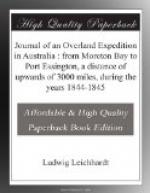During the night we had a very heavy thunder-storm which filled our creek and made its numerous waterfalls roar.
Nov. 20.—We proceeded on our tree-marked line to the slope, and descending, arrived, after some difficulty, safe and sound in the valley. Our horses and cattle were, however, in a distressing condition. The passage along rocky creeks, between the loose blocks of which their feet were constantly slipping, had rendered them very foot-sore, and had covered their legs with sores. The feed had latterly consisted either of coarse grasses, or a small sedge, which they did not like. But, in the valley, all the tender grasses reappeared in the utmost profusion, on which horses and bullocks fed most greedily during the short rest I allowed them after reaching the foot of the slope. The creek formed a fine waterfall of very great height, like a silver belt between rich green vegetation, behind which the bare mountain walls alone were visible. I proceeded down the creek about three miles to the north-west, when it joined a larger creek from the south-west. Here one of our two remaining bullocks refused to go any further; and as our meat bags were empty, I decided upon stopping in this favourable spot to kill the bullock.
Careya arborea, the broad-leaved Terminalia, Coniogeton arborescens, an umbrageous white-gum tree, and Pandanus, together with the luxuriant young grass, gave to the country a most pleasing aspect. But the late thunder-storm had rendered the ground very damp, and that with the mawkish smell of our drying meat, soon made our camp very disagreeable. In the rocky gullies of the table land, we had observed a great number of shrubs, amongst which a species of Pleurandra, a dwarf Calythrix, a prostrate woolly Grevillea, and a red Melaleuca, were the most interesting. Near the slope by which we entered the valley, a species of Achras was found, but with a much smaller fruit than that of Port Jackson.
The melodious whistle of a bird was frequently heard in the most rocky and wretched spots of the table land. It raised its voice, a slow full whistle, by five or six successive half-notes; which was very pleasing, and frequently the only relief while passing through this most perplexing country. The bullock was killed in the afternoon of the 20th, and on the 21st the meat was cut up and put out to dry; the afternoon was very favourable for this purpose; but, at night




